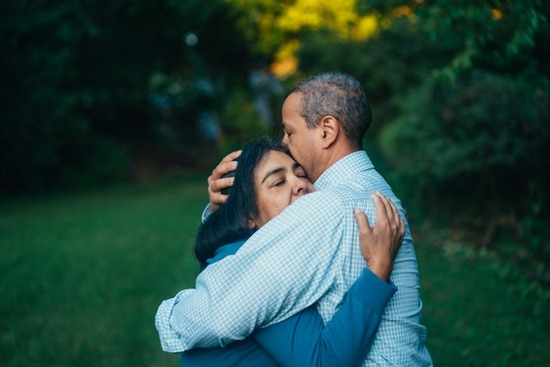Do Seventh-day Adventists Have “Rules” For Marriage?
Around the world, many cultures and religions have various marriage traditions, expectations, or even rules when it comes to choosing a partner, planning the wedding, extended family logistics, or a number of other things.
So it’s possible that some might wonder if Seventh-day Adventists have any specific rules about marriage.
In general, however, the answer is no. Especially in North America, Adventists approach marriage in the same ways many other mainstream Protestant Christian denominations do.
And while we don’t have any distinct Adventist “rules,” we think marriage is one of the most sacred relationships we can have on this earth.
Why?
Because it’s the example God gives us in His Word about the beautiful, self-sacrificing love that exists between Jesus Christ and His people.
That means that Adventists do uphold Bible-based principles and guidelines to help build a healthy marriage.
And that’s what we’ll talk about here. So whether you have a friend marrying an Adventist, are dating an Adventist and are interested in marriage, or you’re just plain curious, this information should help.
We’ll cover questions like:
- What does the Adventist Church believe about marriage, and what does the Bible say?
- How do Adventists approach different aspects of marriage, including:
As you can see, there is a lot to cover, so let’s jump right into the first question.
What do Adventists believe about marriage?

Photo by Luis Tosta on Unsplash
Adventists believe that marriage is a sacred, God-given covenant between one man and one woman. It is something to be enjoyed and celebrated by the couple and those around them. And it should be based on self-sacrificing love and mutual respect.
And when we turn to the Scriptures, where we get all our beliefs and principles, we find that marriage comes down to two things: covenantal love and selfless love.
Specifically, if we look at God’s love for the children of Israel, and, later on, Jesus’ love for His people, we find the perfect example of marriage that Adventists strive to live out in their own relationships.
So let’s quickly explore these two principles and see what the Bible says about them and how it applies to marriage.
Covenantal Love
Throughout the Bible, God shows His desire to enter into a covenantal relationship with His people.
That’s a phrase we don’t hear too often. What does it mean?
In the context of the Bible, a covenantal relationship represents the deepest level of commitment and partnership.
A covenantal relationship demonstrates a promise. This kind of devotion says, “I’m going to be by your side,” “We are going to work together towards a common goal,” and “Even when you mess up, I will be there for you.”
But it’s more than that too. The covenantal relationship takes commitment and devotion one step further. It’s not just “I’m going to be by your side forever,” it’s, “I’m going to enter into an official, public agreement with you that is sacred and binding.”
In other words, people who enter into a covenantal relationship take love seriously enough to make a legal and official commitment. Not because they need that to prove their love but because they eagerly want to declare their promise and commitment to the world.
That’s exactly how God’s relationship with His people works in the Bible. He doesn’t need to prove His love. He is love, after all (1 John 4:16). But, He wanted to publicly demonstrate His love to the children of Israel (along with others they encountered). If anything, this kind of relationship shows how seriously God takes commitment and love in general.
God’s covenantal love can be found all over the Bible in both the Old Testament and New Testament, but here are a couple of our favorite examples:
- Deuteronomy 7:9: “Therefore know that the Lord your God, He is God, the faithful God who keeps covenant and mercy for a thousand generations with those who love Him and keep His commandments” (NKJV).
- Psalm 103:17-18: “But the mercy of the Lord is from everlasting to everlasting, on those who fear Him, and His righteousness to children’s children, to such as keep His covenant, and to those who remember His commandments to do them” (NKJV).
- Jeremiah 31:31-33: “Behold, the days are coming, says the Lord, when I will make a new covenant with the house of Israel and with the house of Judah— not according to the covenant that I made with their fathers in the day that I took them by the hand to lead them out of the land of Egypt, My covenant which they broke, though I was a husband to them, says the Lord. But this is the covenant that I will make with the house of Israel after those days, says the Lord: I will put My law in their minds, and write it on their hearts; and I will be their God, and they shall be My people” (NKJV).
While covenantal love should be two-sided, many of the examples in the Bible are of God expressing sorrow for His children after they have broken their covenant with Him.
In fact, the application to marriage becomes even clearer if we consider the example in the book of Hosea.
God illustrates His broken heartedness over Israel’s ruptured covenant with Him and uses the unfaithful marriage between the prophet Hosea and his wife Gomer as an example. God says that Israel has been “adulterous,” choosing idols and false ideologies over Him.
But covenantal love is steadfast. Even after repeated betrayal, God says to Israel, “How can I give you up? … My heart churns within me, my sympathy is stirred” (Hosea 11:8, NKJV).
It’s truly a beautiful example, not only of how committed God is to us—He will not give us up—but also of how God desires for us to commit to each other.
Of course, we are not God. We are imperfect. Sometimes, even within the context of marriage, people can betray their spouse and wound them so deeply, whether through adultery, abuse, or otherwise, that the covenantal relationship cannot be repaired.
While covenantal love is the ideal, that does not mean a person should stay in a dangerous or abusive situation. More on that later.
For now, let’s talk about the other biblical principles that guide Adventist marriages.
Selfless love

Photo by Gus Moretta on Unsplash
Selfless love is the core principle that Adventists apply to their marriage relationships. It’s the purest form of love, as it is completely unconditional. It should be the cornerstone of any relationship, and the Bible supports this.
When you consider the teachings of Jesus and what the Bible says about His love for us, it becomes clear that selfless love is at the heart of the Bible and the plan of salvation. Likewise, it should be the foundation of every marriage!
Selfless Love is pretty self-explanatory—it’s love that’s unselfish. It’s always oriented toward serving someone else and putting them above yourself.
And while it’s kind of easy to define, it’s especially hard to live out. Selfless love sometimes feels counterintuitive to how we think about love in the modern day. Love is often portrayed as a feeling that makes me happy and gives me fulfillment.
Selfless love says the opposite: love and marriage should be about the other person, not about you. It’s about service to a person you love more than your own life. That, like Jesus says, exhibits the greatest love: “to lay down one’s life…” (John 15:13, NKJV).
This principle is exemplified through Jesus’ selfless sacrifice for us on the Cross. And this same image is used when Paul talks about marriage in Ephesians 5. He calls husbands and wives to submit to each other.
And the marriage relationship is compared to Jesus’ relationship with His people, who He sacrificed Himself for. So, Adventists believe that marriage is about loving your spouse selflessly so that your relationship is in a state of mutual submission.
There are many more lessons we can learn from the Bible about marriage, but these two principles—covenantal and selfless love—are the foundation of how Adventists think about marriage. Every other guideline and principle we have draws precisely from these two foundational principles.
Is love all you need?
While love should be the foundation of all marriage relationships, there is more to marriage than love.
Selfless love can exist in many types of relationships. But love doesn’t automatically equal compatibility.
Two people may have great mutual respect and love for one another. But if they’re not compatible, building a life together will be difficult. Or it may not work out at all.
For a marriage to work, it needs both. And compatibility builds on a strong foundation of selfless love. This means that, when it comes to core values, beliefs, and priorities, the couple is united and understanding of each other. They are a team.
And it’s because compatibility is so crucial that the Adventist Church has particular guidelines and specifications on many of these topics. After all, the Bible does ask, “Can two walk together, unless they are agreed?” (Amos 3:3, NKJV).
While these might sound like “rules,” they aren’t. Instead, they are principles that Adventists believe will help a marriage flourish when both parties keep them in mind and proceed accordingly.
Adventist thoughts about marriage

Photo by Andy Holmes on Unsplash
Now let’s go over a few quick answers to your questions about Adventists and marriage. We’ll cover many different topics, so you can jump to the ones you’re most interested in.
- Choosing a marriage partner
- Living together before marriage
- The marriage process
- Adventist weddings
- Intimacy
- The role of faith in the relationship
- Marriage roles
- Conflict resolution
- Church support for marriage
- Divorce
- Remarriage
Note that though we speak generally about Adventists, Adventism is made up of individuals! This means that these topics might be regarded differently by different people, depending on how that person was raised, what their cultural customs and practices are, and their own personal preferences.
Choosing a marriage partner
The underlying principle of this point is that Adventist individuals have complete personal freedom to choose who they want to date and marry.
Adventists do often date and become engaged to other Adventists. This is largely because they tend to find themselves in similar spaces, like at church, activities/functions, school, college, etc.
And it’s also likely that two Adventists may find more in common than an Adventist paired with someone who isn’t, or especially someone who isn’t a Christian.
The Bible does mention some guidelines for marrying people who believe differently than you, such as instructions to the children of Israel in Deuteronomy (Deuteronomy 7:3-4) or to the early church in 2 Corinthians 6:14-15.
While these verses can offer general guidance and caution, we have to remember that they were written in a specific context for a specific people. In both situations, God was trying to preserve and nurture a fragile, new group of people, specifically selected to further His message.
And we can see from the example of the children of Israel that whenever they did intermarry with other people groups—like those who promoted idol worship—it often resulted in pain on both sides.
Yet, in some cases, marrying people with different beliefs and backgrounds worked out. The marriage of Ruth and Boaz is a great example of this (she is even part of the genealogy of Jesus!).
As you can see, this really comes down to a personal choice between the couple and God.
But there is no explicit rule that prohibits or discourages Adventists from dating and marrying individuals with differing beliefs. The church manual does acknowledge that marriages between people who uphold similar beliefs and values are more likely to thrive, but its final message is this: If couples of differing beliefs choose to be married, the church would treat them with “love and concern with the purpose of encouraging the couple toward complete unity in Christ.”1
Living together before marriage

Photo by No Revisions on Unsplash
Cohabitation, or living together before marriage, is common nowadays. And while the Adventist Church doesn’t specifically mention it in an official capacity, Adventists generally would advise against it.
It comes back to the principle of a covenantal relationship. If covenantal love is one of the biblical models for marriage, then two individuals should be prepared to enter into a public promise of their love for each other, such as in a wedding ceremony.
Another thing to consider is that more often than not, couples who live together before marriage are sexually active. This kind of intimacy, practiced before the covenantal promise of marriage, can lead to a lot of hurt and complications if the couple decides to separate.
While the Bible doesn’t explicitly mention cohabitation (which rarely would’ve occurred in the ancient world), we can always remember that God’s desire for us in marriage is to enter into a covenant together. Living together before marriage may undermine the covenantal promise that couples should enter into.
The marriage process
What does the marriage process look like for Adventists? It’s probably not much different than you might expect. Adventist individuals usually date for however long they need/like.
Once engaged, Adventists usually try to do a few sessions of premarital counseling with an Adventist counselor or pastor. The Seventh-day Adventist Church Manual states that “the main purpose of premarital education/counseling is to prepare couples for the challenges they will encounter in married life” (p. 160). But this isn’t required. However, in the United States, you can actually get a discount on your marriage license if you have proof of premarital counseling (depending on the state)!2
You can find resources to learn more about premarital counseling at the Adventist Family Ministries website.
Adventist weddings

Photo by Álvaro CvG on Unsplash
Adventist weddings are similar to many other Christian weddings. The service is usually spiritually-oriented, as Adventists regard marriage as a both a personal and spiritual commitment.
The reception is a fun and celebratory time! It’s often filled with good food, laughter, music, games, and endearing speeches.
One difference some may notice, however, is that Adventists tend to forgo alcoholic drinks, but will sometimes have sparkling cider for toasts.
Just like any other celebration, Adventist weddings will vary based on the culture and customs of the couple getting married.
Intimacy in Adventist marriages
Adventist marriages should be intimate: physically, emotionally, and spiritually. When we think about physical intimacy, specifically in a marriage, we can remember the biblical principles we talked about earlier. Sexual intimacy should exhibit devotion and selfless love to your spouse.
For Adventists, like many other Christians, sexual intimacy is something that ideally happens within the context of marriage. It is something that is regarded as beautiful, special, enjoyable, and deeply bonding. Considered a gift from God, intimacy should be regularly enjoyed within a marriage, with mutual love and respect at its core.
The role of faith in Adventist marriages

Photo by Cassidy Rowell on Unsplash
Faith plays an important role in an Adventist marriage. Adventist pastors, when officiating wedding ceremonies, often say that a marriage commitment is both horizontal and vertical. That refers to commitment between spouses, and between the couple and God. It is only through an intentional relationship with God that we can grow in the selfless love that will make a marriage relationship thrive.
Faith in an Adventist marriage means both nurturing your faith individually and together. Each individual in a marriage should do what they can to maintain their own faith. Then, together, they can help each other continue to grow their faith in new ways. Many Adventist couples pray, read the Bible, and do daily devotions together to nurture their faith as a couple.
Marriage roles
The Adventist Church has no official guidelines or expectations regarding marriage roles. And Adventists can figure out roles within a marriage themselves. Again, these roles should be based on the principles of covenantal and selfless love. Each partner should consistently seek to serve the other.
We can turn to Adam and Eve—the first couple to ever be married—as our example. In the Garden of Eden, God made Adam and Eve partners. And together, He entrusted them to rule over their domain and care for it (Genesis 1:28). He did not intend for one spouse to rule over the other.
So when it comes to roles and responsibilities, every couple will vary. There is no reason why an Adventist couple shouldn’t be able to choose what they want their marriage to look like as long as it comes back to self-sacrificing, covenantal love and mutual respect.
Conflict Resolution
There isn’t any specific “Adventist way” to resolve conflict. Adventist couples strive to resolve conflict in their marriage the same way that any other healthy, Christian marriage would.
Matthew 18 gives us a good example of conflict resolution:
If your brother or sister sins, go and point out their fault, just between the two of you. If they listen to you, you have won them over. But if they will not listen, take one or two others along, so that ‘every matter may be established by the testimony of two or three witnesses. If they still refuse to listen, tell it to the church” (Matthew 18:15-17, NIV).
Ideally, conflict should be resolved through respectful discussion, where the couple would humbly listen to the other to learn their perspective. But as the example from the Word of God shows, conflicts are not always resolved simply between two people. Sometimes, when conflicts are deeper than routine disagreements, Adventists might seek outside help, which leads us to our next point.
Church support for marriage
The Adventist Church offers a lot of support for married couples, whether that’s through premarital counseling, marriage counseling, or through holding events and seminars to help people nurture their marriages.
Marriage counseling is usually conducted by an in-house counselor or pastor at a host church. In fact, many Adventist pastors also have degrees in marriage and family counseling, though that isn’t a requirement to become a pastor. Couples struggling in their marriages, whether with infidelity, addiction, or seemingly irreconcilable differences, can seek counsel in the church.
However, there are instances where Adventist marriages do fall apart, and in that case, divorce is something that an Adventist couple might go through, which brings us to our last point.
Divorce in Adventist marriages

Photo by Sander Sammy on Unsplash
Adventist marriages, like every other marriage, are made up of two imperfect human beings, and as such, are susceptible to all manners of issues. While the ideal is for an Adventist marriage to be a lifelong commitment centered on self-sacrificial love, this doesn’t always happen. So, the Adventist Church does allow divorce.
This means that when a member of an Adventist marriage finds themselves the victim of adultery, other kinds of infidelity, abuse, and other unforeseen circumstances, that person can pursue divorce without fear of disfellowship or judgment from the church or other church members.
The church holds that the unfaithfulness that the Bible talks about as grounds for divorce (like in Matthew 19:9) not only includes adultery but other kinds of unfaithfulness as well. This includes incest, rape, sexual abuse, or other things “recognized as a misuse of sexual powers” and “violations of the divine intention in marriage” (Seventh-day Adventist Church Manual, p. 165).
Remarriage in the Adventist church
Remarriage is a deeply personal decision, and the Adventist Church recognizes that. In cases where an individual’s partner has died, or has divorced them because of abandonment due to differing spiritual beliefs or unfaithfulness, then the Adventist Church supports remarriage, which it believes to be in line with Jesus’s words in Matthew 19:9 and 1 Corinthians 7:10-15.
While death and unfaithfulness have no place in God’s original plan for marriage, we live in a broken and sinful world where these things happen. Someone who has been the victim of this should not be kept from marrying again.
As with all things, God is merciful, and the Seventh-day Adventist Church Manual makes it clear that God’s mercy and grace prevail over the complications that divorce and remarriage may bring.
To be more like Christ
In the end, an Adventist marriage is meant to draw both members closer to each other and closer to Christ. We would hope that Adventists who choose to get married would learn even more about the selflessness of Christ and strive to be a shining example of His love to each other and to those around them.
Looking for more information about healthy, principled relationships?
- Seventh-day Adventist Church Manual, p. 160 [↵]
- https://www.withours.com/discounts-on-state-marriage-licenses [↵]
Questions about Adventists? Ask here!
Find answers to your questions about Seventh-day Adventists
More Answers
The Health Benefits of Fresh Air You Should Know About
The Health Benefits of Fresh Air You Should Know About“When you can’t breathe, nothing else matters,” the American Lung Association tells us. And while that’s true, the kind of air you’re breathing will determine the health benefits you experience. Breathing fresh...
What Do Seventh-day Adventists Choose to Eat?
What Do Seventh-day Adventists Choose to Eat?Food blogs overwhelm the internet; food fads are all the rage; and copycat and healthy versions of food are the subject of many a get-together. Eating—and eating the best way—is a big deal. And everybody has a different...
10 Incredible Ways Sunlight Can Improve Your Health
10 Incredible Ways Sunlight Can Improve Your HealthAre you concerned about sunlight’s negative effects? You might be the one who lathers on the sunscreen and covers up when you go outside. Or maybe you avoid being outside as much as possible. You might be surprised,...
Why Is Water So Important?
Why Is Water So Important?We all know that water is a substance we can’t live without. It quenches our thirst and keeps us hydrated on the inside. And it’s necessary for hygiene and cleansing on the outside too. But did you know that the cleansing properties of water...
Ellen White’s Writings and the Adventist Health Message
Seventh-day Adventists are known for their emphasis on healthy living. And Ellen G. White was a significant influence in the development of this priority and practice among Adventists.
Health Clinics
Ellen White and Adventist Healthcare—Ahead of Their Time Medical care in the mid-1800s was primitive, to say the least. Basic concepts we take for granted—such as proper handwashing or recognizing the dangers of bloodletting—were nonexistent. And doctors often had...
What Did Ellen White Teach about Vegetarianism?
What Did Ellen White Teach about Vegetarianism?One thing you might have heard about Seventh-day Adventists is their emphasis on a vegetarian lifestyle. If you’re wondering why that is, it goes back to our church’s humble beginnings: As Adventists studied the Bible,...
How Ellen White’s Teachings Can Improve Your Health
How Ellen White’s Teachings Can Improve Your Health Healthcare in the nineteenth century was said to leave “more disease than it took away” with its use of bloodletting and “medicines” like mercury and arsenic.1 As people questioned these methods, new approaches...
Change Your Perspective on Life with These 5 Mindsets
5 Biblical Mindsets to Change Your Life for the Better Sometimes, life is just plain hard. There’s no way around it. So would thinking about things differently really change anything? Our perspective on life, and everything it throws at us, affects more than we’re...
Bible Promises for When You’re Worried or Fearful
Bible Promises for When You’re Worried or Fearful The Bible is full of beautiful promises that can comfort us in a variety of situations. They can give us hope when we are hopeless, make us feel grateful for God’s love, and comfort us when we’re grieving or suffering....
12 Practical Ways to Overcome Worry
12 Practical Ways to Overcome Worry DISCLAIMER: This content is for informational purposes only. It does not constitute any professional medical advice and is not intended as a substitute for professional mental health therapy. It’s easy to get stuck in a cycle of...
How the Bible Talks About Worry, Fear, and Anxiety
How the Bible Talks About Worry, Fear, and Anxiety Worry and fear are the ingredients of anxiety. It’s easy to see how the world isn’t perfect—and the anticipation of a bad event or experience (that may or may not even happen) can end up draining the peace and...
How to Calm Anxious Thoughts, Using the Bible
How to Calm Anxious Thoughts, Using the Bible You were expecting a phone call from your daughter half an hour ago, and she still hasn’t called. She’s also not answering your calls. You feel your heart thumping as your thoughts race: What if she’s been in a car...
What You Should Know About the Adventist Health Studies
What You Should Know About the Adventist Health StudiesYou may have heard that Seventh-day Adventists care about health. But what you may not know is that Adventists have been the subjects of long-term research into lifestyle and health. Since 1958, researchers from...
Benefits of Sunlight
Yes, There Are Health Benefits of SunlightDespite the bad reputation it’s gotten, sunlight is generally associated with positivity, as shown by songs like “You Are My Sunshine,” or phrases that refer to delightful people as having a “sunny disposition.” There’s a...
Why Your Body Needs Rest for Optimal Health
Why Your Body Needs Rest for Optimal HealthStruggling to think straight? Wondering why you can’t remember that important tidbit you heard earlier today? Feeling like your emotions are about to explode? These are just some of the symptoms that can reveal your need for...
The Seventh-day Adventist Diet: One of Our Key Longevity Secrets
The Seventh-day Adventist Diet: One of Our Key Longevity SecretsOats, avocados, lentils, tofu—probably not what you first think of in a standard American diet. But if you show up at the home of an Adventist, chances are you may be served one of these staples. Out of a...
Why You Need Fresh Air
Why You Need Fresh Air“When you can’t breathe, nothing else matters,” the American Lung Association tells us. We couldn’t agree more! Breathing in clean air is an essential part of caring for our bodies, which God has given us. Together with other health principles,...
Sabbath Meal
Everything You Need to Know About Sabbath MealsFor Seventh-day Adventists, sharing a Sabbath meal with friends and family is one of the most special and memorable parts of the Sabbath. That’s why we want to share with you all about Sabbath meals and why they’re such a...
Adventists and Healthy Living
Adventists and Healthy LivingWhat’s the Adventist “Health Message” All About? One thing Seventh-day Adventists are known for is their emphasis on living healthy lives. Since our bodies are living temples of the Holy Spirit (1 Corinthians 6:19, 20), we strive to stay...
Water’s Importance—Physical Benefits and Spiritual Applications
Water’s Importance—Physical Benefits and Spiritual Applications We all know that water is a substance we can’t live without. Not only does it quench our thirst and keep us hydrated from the inside, but it’s necessary for hygiene and cleansing on the outside as well....
How Important is a “Day of Rest?”
How Important is a “Day of Rest?” Why God Created a Day for Downtime by Martin Casper Do you ever experience the feeling of complete overload? Do you feel like the only way you can get ahead is by slamming it 24/7? I hear these types of comments more and more...
7 Reasons Why a Day of Rest is Important
7 Reasons Why a Day of Rest is ImportantWe live in a fast-paced world. It seems as if success is measured in how much you can do in a short amount of time. (Extra points for the service or product that is available 24/7). The idea that we will be more successful if we...
How do Adventists choose what to eat?
How do Adventists choose what to eat?Every day, parents go through the ritual of getting their kids to eat what is healthy and good while trying to steer them away from what can hinder the growth of their developing bodies. Nutritionists work with their clients to...
How Can I Have a Better Marriage?
Is it possible to have a happy marriage?
How do Adventists make movie and music choices?
How do Adventists make movie and music choices?Cinema has come a long way since the first clips of motion pictures came to light in 1878. As the decades rolled on, film and music producers have created rivers of movies and albums for the masses. Today, watching movies...
Why are many Adventists Vegetarian?
Why are many Adventists Vegetarian?The diet intended for man is outlined in Genesis 1:29, “And God said, ‘See, I have given you every herb that yields seed which is on the face of all the earth, and every tree whose fruit yields seed; to you it shall be for food.’”...
Didn’t find your answer? Ask us!
We understand your concern of having questions but not knowing who to ask—we’ve felt it ourselves. When you’re ready to learn more about Adventists, send us a question! We know a thing or two about Adventists.





















